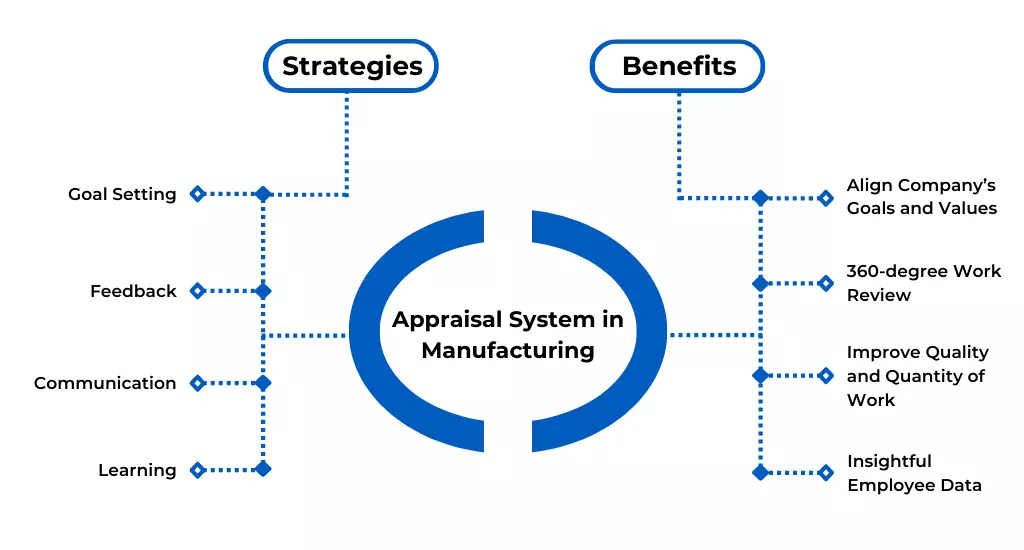The manufacturing industries are associated with work that is driven by manual efforts for decades. Since manufacturing focus on the high volume of production, the industry has rapidly embarrassed machinery and has shown an active shift toward automation.
The performance of the employees is what ultimately translates into the productivity of the organization. The manufacturing industry needs to achieve organizational goals and targets. And to increase productivity it is essential to have proper performance management in place for the manufacturing industry.
Performance appraisal plays a crucial role in understanding the challenges at work and finding the solution. Manufacturing often chooses to work in various shifts throughout the day to achieve the targets. Employee data is important to understand various aspects of the work process and improve productivity. Whereas multiple shifts and different physical locations make it difficult to get sufficient data on employee performance. Making an effective performance appraisal system in manufacturing sector has many challenges as well as benefits and we will be discussing a few of those in this here to get a wider glance and find solutions.

Performance Management Challenges in the Manufacturing Industry
Manufacturing has faced numerous challenges related to participation since the pandemic. In addition to that pandemic-driven demands of the goods forces the industry to push the deadlines yet the social distancing norms and scarcity of workforce on the floor make it even more challenging. That also brings the industry to focus more on the production and the performance of the employee. The combined effect of the global supply chain disruption and numerous shutdowns of the manufacturing units has added to the difficulties.
The added pressure of growing demand in the presence of other challenges leads to a need to have a performance and development program. A systematic approach to performance management help manufacturing sector to be more productive and stay at par with market demands.
Also Read: HR Challenges in the Manufacturing Industry and Solutions
Performance Management Strategies for Manufacturing Industry
The manufacturing industry needs a robust performance management strategy to ensure the achievement of its target as listed below.
Goal Setting
Setting goals is one of the prime aspects when it comes to performance management in manufacturing sector. The best way to ensure that the company goals can be achieved is to align individuals’ goals to the company goals. The objectives of every department, team, as well as individual, have to be well defined.
Goal setting for performance management in manufacturing companies helps you to break down the organizational goals in various departments, teams as well as individuals. With the clarity on target, each unit in the manufacturing company put focused efforts and also help their colleagues to achieve goals for their team. This increases the teamwork and quality of communication in a firm.
Good performance management in the manufacturing industry is when the individual, as well as a team goal, helps the employee to improve their performance. A well-defined and clear goal helps line workers to understand their responsibility and build accountability as a part of the team. Manufacturing jobs often have monotonous and repetitive work responsibilities. That is likely to lead to disengagement from the work.
Setting goals brings the necessary sense of excitement to the work as it encourages a healthy sense of competition among the teams and peers. Goals should be practical and achievable and should not burden employees with extra work nor should it lead to performance pressure.
Feedback
Having goals is not enough if the employee does not get the necessary feedback for their work. The performance appraisals in the manufacturing industry should set parameters for measuring the individual’s productivity. The most effective way is to inform them about the scope of improvement immediately and on a regular basis.
The right way for appraisals and performance is to create a system for them to get regular feedback. The timely feedback helps employees to make the necessary adjustment in their behavior before it’s too late. There should be also a system for 360-degree feedback from the managers, peers as well as subordinates of the employees. This helps to create a good relationship between the employees and encourages them to help their team members.
Communication
A good performance management system needs healthy communication throughout the organization. The supervisors and managers need to engage employees in the face to face conversations on the regular basis. These conversations can be short ones with feedback or asking them about the challenges they might be facing at work.
Open communication among peers and with superiors makes it easy for the employee to receive valuable feedback immediately. Healthy communication also ensures that the management gets essential work-related data. That helps them to understand the constraints in the process and takes informed decisions to improve productivity and processes.
Learning
Give employees the opportunity to learn and grow in their careers. You can add the involvement of the employees in the training courses and their progress as one of the parameters in the performance appraisal. This way companies in manufacturing industries will always have employees with the updated skillset and it will also increase employee engagement at work.
Benefits Of Performance Management in the Manufacturing Industry
The manufacturing industry has been slow in adopting the monthly or weekly performance appraisal for the employees. Strategic employee performance management will help the industry get insightful data to make informed decisions. Following are a few benefits of performance management that might help organizations to achieve their goals.
- Performance management in manufacturing helps you to align the company goals and values to an individual’s goals.
- Goal setting improves the morale of employees and they feel motivated to put higher efforts into their work to achieve improved quality and quantity of their work.
- The performance appraisal from the colleagues as well as the managers helps employees to get a better view of the aspects where they can improve their performance.
- A performance management system improves the transparency of the review and ensures that the employee gets an unbiased appraisal.
- The individual goal and the appraisals also increase the sense of responsibility and accountability in the workers.
- The importance of performance appraisal is that it allow you to gather employees data which helps HR and management to understand the upskill requirement for particular employees so the performance can be increased with targeted efforts.
- Performance management in manufacturing also helps to harness healthy competition among the workers which increases an individual’s drive for better performance.
- performance management in manufacturing also helps to evaluate the output of the employees on various aspects such as quality of product, safety concerns, and customer service.
- It helps you to gather meaningful data to improve the productivity of the company.
Conclusion
The manufacturing industry has faced many challenges and is struggling to increase productivity to match the post-pandemic demand for goods. The output of the manufacturing company depends on the productivity of its employees. A robust performance appraisal system in the manufacturing sector has many benefits and will help companies achieve higher targets.








